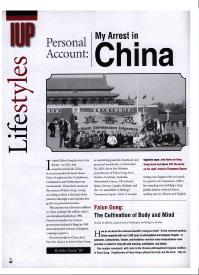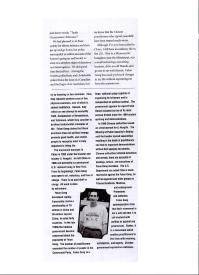Indiana University of Pennsylvania Magazine: Falun Gong: The Cultivation of Body and Mind
How do we derive the maximum benefit in living our lives? To this universal question, China responds with over 2,500 years of philosophical and religious insights. In particular, Confucianism, Taoism, and Buddhism--and their many interpretations--have provided a context for living life with meaning, satisfaction, and dignity.
One modern movement, with roots in the Chinese philosophical/religious tradition, is Falun Gong. Practitioners of Falun Gong cultivate the body and the mind. They do so by focusing on two elements. First, they regularly perform a set of five physical exercises, one of which is seated meditation. Second, they reflect on and attempt to exemplify Truth, Compassion or Benevolence, and Tolerance, which they consider to be three fundamental principles of life. Falun Gong claims that these practices draw out spiritual energy, promote good health, and enable people to recognize what is truly important in living life.
The movement emerged in China in 1992 under the founder and teacher Li Hongzhi. He left China in 1996 and presently is a permanent U.S. resident living in New York. From its beginnings, Falun Gong was open to all, voluntary, and free of charge. There is no paid staff or clergy. All work is done by volunteers.
Falun Gong developed rapidly. It presently claims a membership of 70 million in China and 30 million beyond China, in some forty countries. [Editor's note: Falun Gong has no membership and has no information about the distribution of the practitioners.] In the late 1990s the Chinese government became concerned about the popularity of Falun Gong. The number of practitioners exceeded the number of people in the Communist Party. Falun Gong is a large, national group capable of organizing its followers and is independent of political control. [Editor's note: Falun Gong has no formal organization.][...]
In 1999 [...] Chinese authorities initiated detentions and arrests; there are accounts of beatings, torture, and executions of Falun Gong members. The U.S. Department has noted China's harsh repression against the Falun Gong, as well as against such other groups as Tibetan Buddhists, Muslims, and underground Protestants and Catholics.
Falun Gong spokespersons state that their movement is [...] not involved with politics or against any government. Rather, it is a movement which enables practitioners to live lives with meaning, satisfaction and dignity. Chinese government repression continues.
á

